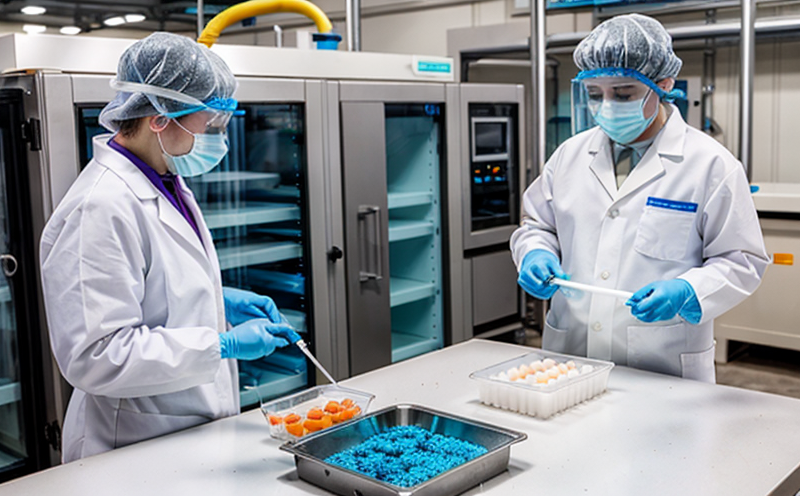Soft Toy Wash Resistance and Microbial Growth Test
The soft toy wash resistance and microbial growth test is a critical procedure to ensure that plush toys are safe for children and other users. This test evaluates the durability of a toy's fabric during cleaning processes, ensuring it can withstand repeated washing cycles without compromising its integrity or shedding harmful fibers.
Microbial contamination is another key concern in soft toy testing. Contaminants like bacteria, fungi, and viruses can spread through toys that are frequently handled by children. This test checks for the ability of a toy to maintain microbial safety even after multiple washings. Compliance with this test ensures that toys meet international standards such as ISO 8682:2015 and ASTM F903-17.
The testing process involves exposing the soft toy to various cleaning agents under controlled conditions, simulating real-world washing scenarios. Following the wash cycle, the fabric is analyzed for any signs of degradation or microbial regrowth. This includes checking for thread breaks, color fading, and the presence of viable microorganisms.
For quality managers and compliance officers responsible for ensuring product safety, this test provides assurance that toys meet stringent hygiene standards. It helps in identifying potential risks early on during the development phase, allowing manufacturers to make necessary adjustments before production begins.
R&D engineers benefit from this testing by gaining insights into how different materials and designs perform under various washing conditions. This information is invaluable for improving future product iterations while minimizing recalls due to safety issues.
Procurement teams can leverage the results of these tests when selecting suppliers who adhere strictly to such rigorous standards. By specifying wash resistance and microbial growth testing as part of their supplier evaluation criteria, they ensure that only high-quality products reach consumers.
Quality and Reliability Assurance
The soft toy wash resistance and microbial growth test plays a crucial role in maintaining the quality and reliability of products. By subjecting toys to rigorous cleaning conditions, manufacturers can identify any weaknesses or vulnerabilities early on. This proactive approach allows for timely interventions, preventing issues that could arise later in production or after product release.
Regular testing ensures consistency across batches, providing peace of mind for both producers and consumers. It also helps in tracking trends over time, allowing companies to continuously improve their manufacturing processes based on real-world data. For instance, if certain materials consistently fail wash resistance tests, manufacturers can explore alternative fabrics that better withstand cleaning.
In addition to detecting problems within individual units, this test provides broader insights into the overall quality of a company’s product line. Consistent pass rates across different products indicate robust manufacturing practices and well-trained personnel. Conversely, poor performance could signal areas requiring attention or improvement.
Use Cases and Application Examples
This test is particularly applicable to manufacturers of plush toys intended for young children who are prone to mouthing objects. It ensures that these items remain safe even after prolonged exposure to saliva, which can potentially introduce harmful microorganisms into the toy.
Additionally, soft toys used in healthcare settings must undergo this testing to ensure they do not pose any risks to patients or staff. Hospitals and clinics often require stringent hygiene protocols due to the presence of immunocompromised individuals who are particularly vulnerable to infections.
In educational environments where shared materials are common, ensuring that soft toys meet wash resistance standards helps prevent cross-contamination among students. Schools and daycares may specify this requirement as part of their procurement policies to maintain a hygienic learning environment.
For companies producing outdoor toys or those designed for rough play, demonstrating the resilience of these products through successful wash resistance tests can be a competitive advantage. Parents are increasingly seeking durable yet safe options that will last longer with minimal maintenance.
Why Choose This Test
- Promotes Safety: Ensures toys do not release harmful fibers or chemicals during repeated washings.
- Enhances Durability: Evaluates the toy's ability to withstand harsh cleaning conditions without losing its structural integrity.
- Meets Regulatory Requirements: Guarantees compliance with international standards like ISO 8682:2015 and ASTM F903-17.
- Improves Consumer Confidence: Builds trust by demonstrating a commitment to producing safe, high-quality products.
- Reduces Risk of Recall: Identifies potential safety hazards early in the production process, reducing the likelihood of product recalls.
- Sustains Hygiene Standards: Maintains microbial safety even after multiple washings, ensuring continuous protection against pathogens.





